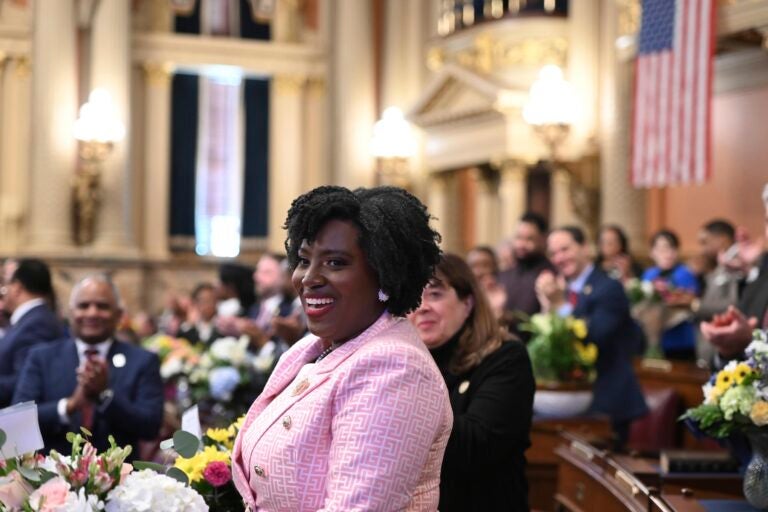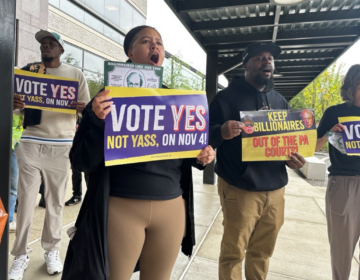Pennsylvania House drops voter ID, passes sweeping election reforms
Republicans supported voter ID in committee, but not enough to muster a floor vote.

Pennsylvania state Rep. Joanna McClinton, D-Philadelphia, smiles after the chamber's members elected her as House speaker for the new two-year legislative session, Jan. 7, 2025, in Harrisburg, Pa. (AP Photo/Marc Levy)
This story originally appeared on WITF.
Republican support for a voter ID bill fell apart before the full Pennsylvania House of Representatives could vote on it. Just a week before, the same bill passed out of a House committee with all 12 Republicans voting in support, alongside two Democrats.
“While I strongly support Voter ID, it is clear that our caucus has specific concerns with the details of this bill and we are continuing to try to work through those concerns,” said House Republican Leader Jesse Topper, R-Bedford, in a statement released by his office. Topper’s office did not answer questions about the caucus’ specific concerns.
Republican Dave Zimmerman of East Earl said he was concerned the bill did not require photo ID. Instead, HB771 was a “nonstrict” voter ID bill that allowed a broad range of acceptable IDs and created an affidavit system that would allow anyone to vote, even if they did not have ID on them.
Republican leaders in the House asked Democrats, who control the chamber, to not to bring the bill up for its scheduled vote Tuesday, according to Democratic House Majority Leader Matthew Bradford, D-Montgomery.
Voter ID only has marginal support from Democrats, but enough to pass certain versions of the bill with Republican support.
“ Democrats are a pragmatic group,” Bradford said. “We know we have had limited support for it. In the past, Republicans have clamored for this type of legislation.”
Zimmerman and three other Republicans introduced stricter versions of voter ID bills that have not moved in the House. Two of those bills, including Zimmerman’s, would require constitutional amendments.
Democrats will not support any bills “that would impair or infringe the right to vote, let alone in the Constitution,” Bradford said.
Voter ID responds to a “made-up issue,” Bradford said, originating in lies about election security pushed by President Donald Trump after his 2020 election loss.
Broad election reform passes, sent to Senate
The nonstrict voter ID bill had been scheduled for the same floor vote as omnibus election reform legislation brought by House Speaker Joanna McClinton, D-Philadelphia. Her bill, HB1396, advanced on a party-line vote Tuesday, 102-101, sending it to the Senate for consideration.
The 98-page bill includes reforms sought by the County Commissioners Association of Pennsylvania such as the ability to process mail-in ballot return envelopes before Election Day, allowing for faster counting on election night. It also would create early voting, clarify rules for mail-in voting and codify election security processes like pre-election machine testing and post-election audits.
Rep. Tim Bonner, R-Butler, urged a no vote on the bill during debate on the House floor, mainly objecting to the expansion of mail-in voting by requiring drop boxes and creating a process for curing mistakes on the return envelope.
“ House Bill 1396 is unconstitutional because it is a constituent part of, supports and strengthens no-excuse mail-in voting,” Bonner said.
Various aspects of Pennsylvania’s mail-in voting system have been in and out of state and federal courts since Act 77 created no-excuse mail voting in 2019. State and federal courts currently hold that mail-in voting is constitutional, though Bonner said legislators have the responsibility to make that determination for themselves before each vote.
In order to expand mail-in voting, he said, a constitutional amendment should be put before Pennsylvania voters.
McClinton called her bill a common-sense measure that would help county election officials run elections.
Secretary of State Al Schmidt, who is responsible for the state’s elections oversight, said in a press conference May 8 that provisions like early voting and requiring electronic poll books for use as voters check in would help county-level election workers.
Sen. Cris Dush, R-Centre County, who runs the Senate committee that reviews election bills, did not provide a statement on the prospect of the omnibus legislation. He previously stated his highest priority for election reform was introducing voter ID.
When asked if House Democrats were in negotiations with Senate Republicans about a deal to combine voter ID and other election reforms, Bradford said the two sides were in constant contact. He declined to describe the parameters of a deal.

Get daily updates from WHYY News!
WHYY is your source for fact-based, in-depth journalism and information. As a nonprofit organization, we rely on financial support from readers like you. Please give today.





